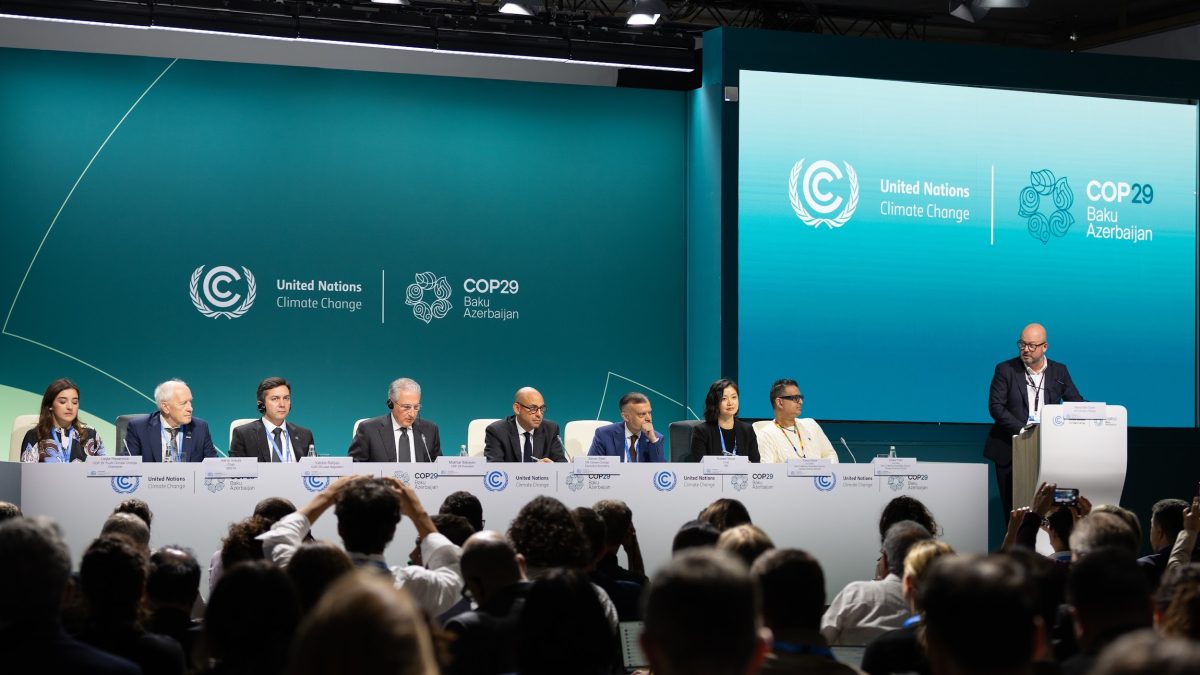The 2024 UN Climate Change Conference (UNFCCC COP29): A Crucial Global Event

Photo Credit : Kiara Worth, UN Climate Change on Flickr (Licensed under CC BY-NC-SA 2.0)
The 2024 UN Climate Change Conference (UNFCCC COP29) is currently underway in Baku, Azerbaijan, from November 11 to 22, 2024. This important global event will bring together countries, organizations, and experts to tackle the urgent challenges posed by climate change, fostering international cooperation to mitigate its effects. As climate change accelerates alongside rapid urbanization, the stakes for this conference are higher than ever. If current trends continue, global temperatures are projected to rise by 1.5°C between 2030 and 2052, and could reach 3°C by 2100. Such an increase would have catastrophic effects, especially for urban areas that are vulnerable to extreme weather events, rising sea levels, and resource insufficiency.
COP29 will focus on enhancing global climate action through stronger commitments, promoting sustainable urban development, and boosting resilience against climate impacts. Key themes will include financing for climate solutions, innovative mitigation strategies, and the protection of natural ecosystems, all emphasizing the urgent need for immediate, collective action to secure a sustainable future.
Coastal Protection and Indonesia’s Efforts
Coastal protection is essential to safeguard ecosystems and communities from environmental threats like erosion, sea-level rise, and extreme weather events. Indonesia, as the world’s largest archipelagic nation with over 95,000 kilometers of coastline, places coastal protection at the heart of its environmental strategy. This commitment aligns with global climate goals and addresses the country's unique vulnerabilities.
One of Indonesia’s most significant achievements in coastal protection is its ambitious mangrove restoration program. Mangroves serve as natural barriers against coastal erosion and storm surges, while also acting as carbon sinks by sequestering large amounts of CO2. In 2021, Indonesia launched a major initiative to rehabilitate 600,000 hectares of degraded mangroves by 2024, underscoring the country’s leadership in using nature-based solutions to enhance climate resilience. This initiative contributes to Indonesia’s Nationally Determined Contributions (NDCs) under the Paris Agreement and supports global efforts to achieve net-zero emissions.
The Role of Blue Carbon in Mitigating Climate Change
Beyond protecting coastlines, coastal ecosystems like mangroves, seagrasses, and tidal marshes are crucial in combating climate change. These "blue carbon" ecosystems are highly effective at capturing and storing carbon dioxide from the atmosphere. Research indicates that Indonesia's mangroves alone have a carbon absorption capacity five times greater than tropical land forests. These ecosystems also support biodiversity, enhance coastal resilience, and help mitigate climate impacts. However, human activities such as land conversion and coastal development pose significant threats to these vital ecosystems. Therefore, conservation and restoration efforts are critical to preserving carbon stocks and ensuring long-term coastal resilience.
During discussions at COP29, Indonesia’s Director of Climate Change Mitigation at the Ministry of Environment, emphasized the importance of the maritime sector in the country’s climate strategy. Recognizing the immense potential of blue carbon, Indonesia has incorporated the protection and restoration of marine and coastal ecosystems into its upcoming second Nationally Determined Contribution (NDC). This move reflects Indonesia’s growing commitment to addressing climate change through both mitigation and adaptation strategies in the maritime sector. Effective emission reductions, marine management, and ongoing research will be essential to reduce the negative impacts of climate change on coastal and marine ecosystems.
Indonesia’s focus on blue carbon initiatives demonstrates its leadership in using coastal ecosystems as a key tool for both climate mitigation and adaptation, not only contributing to national climate goals but also supporting global efforts to combat climate change.
-RN
References
Aileen Saskira Paramadani (2024). Peran Penting Karbon Biru dalam Mitigasi Perubahan Iklim di Wilayah Pesisir Indonesia
World Cities Report 2024: Cities and Climate Action Cities are both the victim. https://unhabitat.org/world-cities-report-2024-cities-and-climate-action

